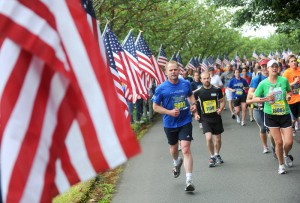 Well, I ran my second half marathon on June 21 and we couldn’t have had nicer weather or a friendlier crowd of long-distance runners and walkers. The highlight was running along the soon-to-be-demolished Alaskan Way Viaduct. I don’t know what the deal was, but I didn’t even see the much-touted VIP porta-potties. Just another promotional scam, I guess.
Well, I ran my second half marathon on June 21 and we couldn’t have had nicer weather or a friendlier crowd of long-distance runners and walkers. The highlight was running along the soon-to-be-demolished Alaskan Way Viaduct. I don’t know what the deal was, but I didn’t even see the much-touted VIP porta-potties. Just another promotional scam, I guess.
Having steeled myself for handling the absurdly crass commercialism of this race (in particular) I think I set myself up to be slapped in the face by the way in which the race was utilized to create a patriotic, pro-military narrative.
It started with the singing of the National Anthem before the race even started. Since we were all standing around waiting to run, I didn’t even have the choice of not standing. (I always applaud politely at the end, in solidarity with the singer who has managed to get through such a difficult song.)
Why are sporting events preceded by the singing of the National Anthem—a militaristic song that celebrates an incident from the War of 1812? Is it to stress the concept of “ national unity” even when the athletes (presumably people from different parts of the United States) are competing against one another? Concepts of “national unity” in the U.S. ignore the fact that this country is in fact not “one nation indivisible” but rather, like Russia before the Revolution, “a prison house of nations.”
Whether we are talking about the Indigenous people whose lands were stolen by the colonizers, people of African descent brought here as slaves or the many immigrants who have been forced by neo-colonialism and neo-liberalism to seek a better wages in this country, there is no “one nation” but rather many nationalities that make up the working class of the U.S.
We finally took off running through the streets, thousands of oddly dressed runners and walkers. Many, many of the people who were running and walking near me were raising money for charities. I was particularly impressed with the level of organization of the “Team in Training” that supports research on blood cancers. These runners and walkers—often running in pairs—wore matching purple t-shirts, and had green-shirted coaches waiting alongside the course to give them encouragement and even salt tablets if needed. Many had signs on their shirts indicating that they were running in memory of a person who had died.
Somehow, the Team in Training runners reminded of the old anti-war poster that reads “It will be a great day when our schools have all the money they need, and our air force has to have a bake-sale to buy a bomber.” It will also be a great day when there is enough money to research and treat cancer and other diseases.
Along the side of the course, at strategic locations, various groups were lined up to give the runners encouragement. Many high school cheerleading squads cheered and waved their pompoms. Certain groups were allowed to set up displays along the course. The ubitiquous Team In Training had a cheering squad and a moving display of photos of people who had died from blood cancers. And then there were the “wear blue: run to remember” folks.
wear blue: run to remember is, according to its website, “a running community that honors the service and sacrifice of the American Military….At official wear blue events, American flags are lined along the race course to honor the fallen, a tribute called the wear blue Mile; each flag is hand-held making it a true living memorial. Placed in front of these flags are large posters with photographs of the Fallen. The wear blue Mile humanizes the ultimate sacrifice made by these American heroes.”
As an anti-war activist, I have reached out to anti-war active duty service people and veterans. I am proud to count among my comrades and friends members of Veterans for Peace, Iraq Veterans Against the War and March Forward! I know how the slogan of “supporting the troops” has been used to promote supporting the war—when in actuality, the best way to support the troops is to bring them home.
I have nothing but solidarity in my heart for families that have lost a loved one in the war on Iraq or Afghanistan—but I have no interest in “honoring” that sacrifice—because it was a sacrifice made for no good purpose. As J.K. Rowling memorably wrote, “There are things worth dying for,” but protecting the interests of imperialism is not one of them.
After we ran past the “wear blue Mile” (I don’t think it was actually a whole mile…) it seemed that every aid station was staffed by a different branch of the Armed Services. Again, I was certainly appreciative of the kindness of these individuals in cheering us on and handing us cups of water as we struggled or sprinted along, but overall, the extraneous events of the race created a patriotic, pro-military narrative that left a bad taste in my mouth.
I began to fantasize about what it would be like if members of the ANSWER Coalition lined the course of a marathon holding banners and encouraged runners to “ keep taking another step for peace with justice!” What if spectators held up pictures of political prisoners like Mumia Abu-Jamal, Leonard Peltier and the Cuban Five, encouraging runners to think of their suffering and sacrifice and to rededicate themselves to fighting for their release? What if socialists cheered on marathoners while demanding Universal Health Care for All instead of charity? At the very least it is something to think about.






